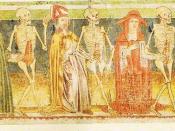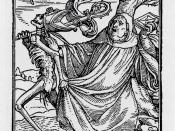Hello everyone. I'm here to talk about Gwen Harwood's poetry and how it reflects her spiritual/philosophical beliefs about life, death and our place in the world. Spiritual is having to do with the soul or spirit, while philosophical is to do with the study of the causes and laws of all things. In Gwen Harwood's poems The Glass Jar an At Mornington, she uses spiritual or philosophical beliefs to show life, death and our place in the world.
'The Glass Jar' deals with recurrent philosophical themes, such as night/day, dark/light, life/death and innocence/experience. Night/day is shown by the 'mostrance', which is used in the Benediction Ceremony, the child thinks that this will keep him safe from the evil spirits and drive out the demons and terrors of the night. The day is represented by the 'resurrected sun', which is alive once more after the death of the night and all it's horrors.
Dark/light is shown by the use of the glass jar to keep light to light up the place including outside which is envisaged in religious terms as 'the holy common place of field and flower'. The dark is shown by the child's fear of the dark, which most children experince. Life/death is also shown by the 'resurrected sun', which is a reference to Christ's ressurrection and is talking about life. The death is shown by the dream the boy has of the Dance of Death, in which death leads people to the grave. The 'Ravening birds' are considered ill omens and are poetically associated with death and darkness. Innocence/experience is shown by the little boy finding out that the glass jar can not help keep the demons away. He also had his innocence lost when he entered the parents bedroom and saw an activity he did...


